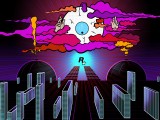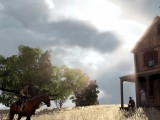This brief discussion on Rockstar Games and their use of generic conventions originates from a very intriguing comment found on our favourite website in the whole wide wo…web, Rock, Paper, Shotgun. Over there, my half-assed ass-essment of the company as “soulless” in my earlier post, On The Love Letter, was earnestly brought into question. The question is as good as any and the topic actually warrants a brief discussion.
This time, I am not referring to Rockstar Games as “faceless”, “insensitive” or “corporate”, although we have actually taken the company to task for that as well. Instead, I’m talking about their use of ethics and morals in their games. I want to preface my point by quickly running through the various genres of fiction in which the Housers’ and Rockstar Games’ past published games have operated in. Just a truncated, short list of games for the sake of illustration: Bully, Grand Theft Auto, The Warriors, Manhunt, Max Payne, LA Noire and Red Dead.

The genres for the aforementioned - do feel free to bring these up in the comments section below; after all, genres are all about giving name tags and definitions to a loose set of features, so it’s all up to debate - could be listed as follows:
School fiction, crime fiction, crime, slasher, hardboiled, detective and modern western.
As you can instantly see, most of the company’s output resides under genres and modes of fiction that are best defined not by the presence, but by the absence of a common framework of ethics and morals.
Hold on, that’s not quite it: What makes all the aforementioned genres (including school fictions) so intriguing to us are in fact their own, more specialized codes of moral operations - of vigilant and mob justice, of manliness and masculinity, of revenge and payback, of responsibility and servitude, and so forth -, the codes of a detached, separate group or a kind of people, society within society, like the mob, the underground, or the underworld.
These are all systems of interaction that do sometimes fall under the principles of humanist dogma, but not in a way that’s applicable to our shared system or society on the whole. We get these windows and avenues - textual, audiovisual or otherwise - into worlds and settings that we know could/would be out there, but do not touch or reach us in tangible ways. That is, if you count out TV news, the morning newspaper, and so forth.
 This brief run through Rockstar’s generic choices basically answers the question above. It’s not that the company is so much “soulless” as their games are - from a strictly PoMo humanist vantage point, anyway. Rockstar’s vice presidents and resident lead writer brothers Dan and Sam Houser have, in my eyes, displayed a great fondness and aptitude towards these types of fictions in both their own games and in their publishing of titles by other companies and developers such as Remedy or Team Bondi.
This brief run through Rockstar’s generic choices basically answers the question above. It’s not that the company is so much “soulless” as their games are - from a strictly PoMo humanist vantage point, anyway. Rockstar’s vice presidents and resident lead writer brothers Dan and Sam Houser have, in my eyes, displayed a great fondness and aptitude towards these types of fictions in both their own games and in their publishing of titles by other companies and developers such as Remedy or Team Bondi.
For example, think of your position as a member of society in Grand Theft Auto - say, the two endings to GTA IV. Think of the ways in which Max Payne redeems himself after being framed. Think Manhunt. These games, though clearly displaying certain specific modes of ethics, deal with people for whom the idea of black and white right and wrong has been permanently blurred.
In many ways, the games are better or at the very least more intriguing for it - but it also means that Rockstar is going to step on the toes of acceptability and good taste every now and then, “Hot Coffee” or not. The Housers, in fact, utilize this grey area very knowingly, as one of their modus operandi has been pushing the envelope of what is possible in video games. We should applaud them for that.
It doesn’t change the fact, however, that Grand Theft Auto IV is as dark and bleak an experience as any!
To summarize, one of the primary reasons as to why Rockstar’s games are so successful in their storytelling is their understanding and grasp of genre and convention. Nearly every first-person shooter on the planet has a highly questionable sense of what it means to be a “good” guy, even if some of them do poke fun at it - for the better or worse.
Yet only in playing Nico Bellic, who is quite possibly even more gagged, tied and bound only to react and respond to misfortune as it comes to him, do we feel like the game has any dialogue whatsoever with the concepts and ideals of ethics and morals at all. By subverting the whole discussion via the use of genre, Rockstar Games actually awards us with more insight to the human condition.
The Housers’ idea and conception of the “human condition” makes you feel really, really bad though, so it’s definitely “soulless”, ok.
Anyone interested in a more through assessment of the concept of genre in Rockstar’s games? Let me know in the comments.